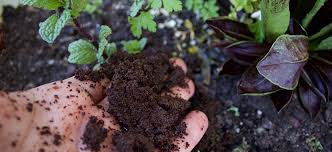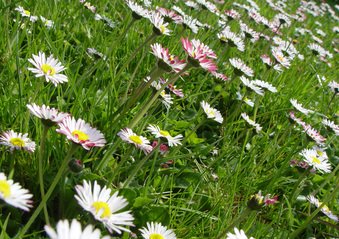How To Improve Your Soil With Organic Material

Compost
The easiest and best way of improving your soil with organic material is to add compost. It is easy to use and readily available from garden centres and some supermarkets and it is relatively cheap.
You can also make your own using organic or inorganic material which can be just as good as the shop bought providing it is done correctly.To make your own compost will take about four to eight weeks this of course can be speed up by using adding special bacteria.
1. To start the process of making your own compost get a large out door container, many of these can be bought from your local council. I obtained one from my local council which had an air tight lid which prevented animals or birds getting in and it had a open bottom which sat on the bare earth which allowed air flow and earth worms and other organisms to act on my compost.
2. Start by collecting dead leaves, newspaper, cardboard, grass clippings, plant food scraps and any tea bags.
3. Then lay the grass or leaves at the bottom of the container to assist with drainage and aeration.
4. Then add compost materials with one layer consisting of dry compost and the other consisting of wet one.
5. Add manure which will help to speed up the process and provide nitrogen.
6. Turn the compost with a fork at least once every two weeks to encourage oxygen and much needed bacteria.
7. Watering the pile occasionally will aid decomposition.The compost should never be soggy or too wet because this will encourage fungi to eat up the mixture before it is put in the soil.
8. Add worms to the pile.
9. The compost will be ready when squeezed it is clumped together but can easily be broken part. Plant fibres still be visible but the compost should be the same all over, if there are large bits they can be returned to your compost bin.
Manure
Using manure (animal waste) which can be from chicken, rabbits, horse or cattle, suitable is another way of improving your soil. Manure will adds extra nutrients to your soil as well as breaking down and improve soil structure and allow it to retain water and nutrients much better. The best way of using manure is by mixing it with compost and you should allow three months between application and harvest of root crops or leafy vegetables such as lettuce and spinach to guard against contamination. If raw manure is used then 120 days must pass before the crop is harvested if the manure has come into direct contact with the soil.
Manure should also be applied with care since you are dealing with animal waste which can contain pathogens such as E coli bacteria, protozoan and viruses which can cause fatal poisoning from eating organic food. These pathogens are usually transfer by faecal contamination of feed or animals followed by ingestion. The numbers of pathogens is usually reduced by most storage methods used on dairies. To prevent this organic standard requires that manure must be sterilised through high temperature thermophilic composting.
You should also try and check the source of your manure. Does the farmer use herbicide on their pasture land as their stock will consume this, which will then be present in their manure if this is the case then you do not need this in your organic garden. When handling any organic material such as manure you should take the necessary precautions such as well a following the basic hygiene rule such as wearing gloves. not eating, drinking or smoking and ensuring you wash your hands after.
Plant Waste

Plant waste or green manure is another way of providing nutrient to your soil to help with your organic garden. Green manure is created by growing a variety of plants such as grass mixture and legume plants such as rye-grass, peas, clover and winter wheat which are then turned into the soil to improve its quality. This type of crops grow very quickly and is very good for improving soil prior to spring planting.
Plant waste can also be waste materials from plants such as fallen autumn leaves and branches. It is relatively easy to create heaps of plant waste which you should then leave for a few months until the waste as broken down to form humus.
Green Manure such as rye-grass and others mentioned above is best sown in late summer or autumn when it will absorb any nutrients which will prevent nutrients from being washed away by winter weather. When you begin to tidy up your garden and turn the soil in the spring, they will release these nutrients back into the soil.Green manures can also be used to cover bare patches of soil in the spaces between crops, or during crop rotation.
Green manure or plant waste is rich in nutrients and will condition your soil, acts as a natural pesticide, fertiliser and provide humic acids. The latter is a very good root simulator and will help to lower Ph level in your soil to make it more neutral. It can also prevent soil erosion and act as a landfill to level your plot before it is converted into a garden. As a home gardener you will find this method of organic fertilisation is very good for your organic garden and is an alternative for animal manure.
The overall benefits of using organic fertiliser whether manure, plant waste or compost is that your garden will benefit from the nutrients as well as beneficial for ground insects.
More on organic material and how to minimise risks can be found on the following websites.
- Royal Horticulture Society- https://www.rhs.org.uk/advice/profile?pid=865
- Gardening Know How - https://www.gardeningknowhow.com/special/organic/compost-for-organic-gardens.htm
- Wikipedia- Organic Farming
- (Pathogens in Manure by John H. Kirk )